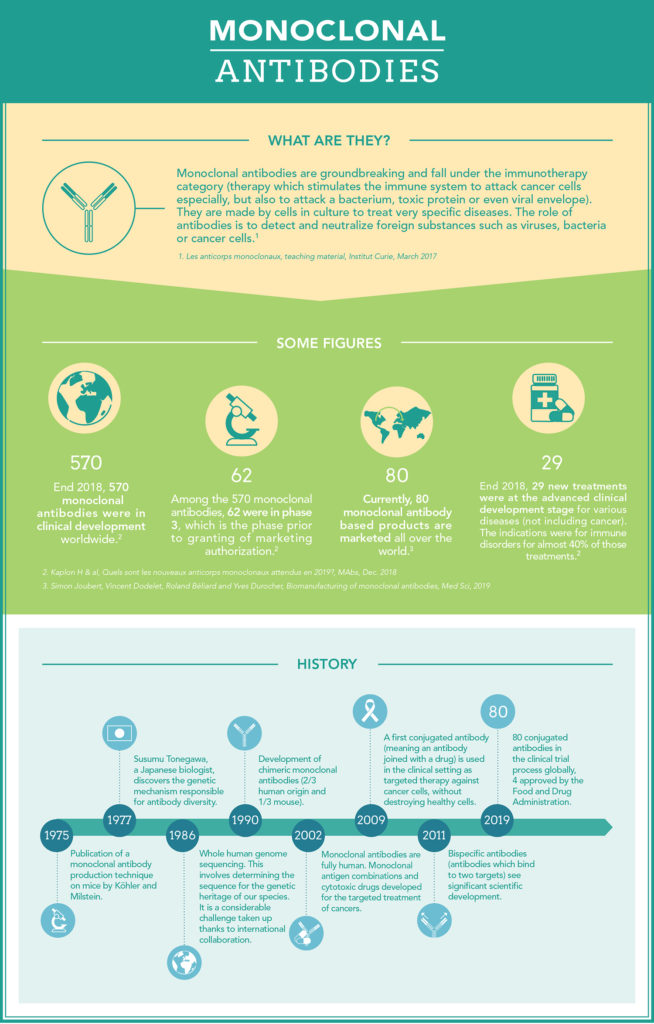Monoclonal antibodies represent one of the most important global pharmacological advances of the past two decades. What are they exactly, and what roles do they play? Here are some answers.
What are antibodies?
We naturally produce antibodies within our immune system in order to protect ourselves from external attacks (bacteria, toxins, viruses). All antibodies work in the same way, by binding to the foreign bodies (also called antigens – most often proteins) responsible for the attack, in order to neutralize them. Antibodies are naturally produced by our B lymphocytes. These lymphocytes, also called white blood cells, have the primary role of participating in the body’s immune defences.
Monoclonal antibodies are “super” antibodies developed in the laboratory and injected into patients as part of specific treatments. These antibodies (also called immunoglobulins) trigger a targeted response by the body to protect it against an attack from a foreign antigen.
They have two main pharmacological properties that differentiate them from the antibodies produced naturally by the body: on the one hand, their ability to bind the target antigen very specifically and, on the other hand, the way they interact with the immune system. These two properties are complementary for optimal therapeutic efficacy.[1]
The genesis of monoclonal antibodies
In 1975, Argentinian biochemist César Milstein and German biologist Georges Köhler produced the first monoclonal antibodies from mouse cells.
These were antibodies resulting from developed hybrid cells, or hybridomas (cells resulting from in vitro hybridization of normal white cells with malignant tumor cells). These cells already have a major advantage because they can multiply indefinitely and give rise to identical daughter cells; each of these cells produces the same antibody, called “monoclonal” because it comes from the same cell and has identical properties (same amino acid sequence, same activity) and is optimized (strong ability to bind and/or destroy the antigen).[2]
Some limits in the use of these antibodies resulting from hybrid cells from mice led to creating entirely human monoclonal antibodies using genetic engineering a few years later.
Today, worldwide, many monoclonal antibodies (more than 75) have obtained marketing authorizations to treat diseases that are difficult to care for such as cancers and inflammatory and neurological diseases. Monoclonal antibodies have broadened the therapeutic arsenal available to physicians to treat patients.[3]

What are their medicinal roles?
Some prospects
Other therapeutic uses for monoclonal antibodies exist, notably for neurological and heart diseases, but their use is currently modest and needs to be researched further.
In summary, the use of monoclonal antibodies is a true therapeutic revolution and the results obtained are extremely encouraging, especially in oncology. However, there are still challenges to contend with in several fields of medicine, in the management of some side effects and even in cancer medicine, since some patients do not respond to these immunotherapies [6]. To this end, the potential combination of different monoclonal antibodies against different antigens will open additional possibilities to treat refractive diseases.
Sources
[1] Theodora Bejan-Angoulvant T,Alexandre J. Mechanism of action and adverse effects of monoclonal antibodies. Med Sci.2019;35:1114-1120. DOI: https://doi.org/10.1051/medsci/2019208
[2] Köhler G., Milstein C. Continuous cultures of fused cells secreting antibody of predefined specificity. Nature. 1975;256:495–497. DOI: 10.1038/256495a0
[3] Bourel D, Teillaud J-L, Anticorps monoclonaux : tours et détours technologiques pour de nouveaux espoirs thérapeutiques [Monoclonal antibodies: Technology around the clock for new therapeutic hopes] CR Biol. 2006;329(4):217-227. DOI:1016/j.crvi.2006.02.006
[4] https://curie.fr/dossier-pedagogique/anticorps-monoclonaux.
[5] Wang C, Li W, DrabekD, et al. A human monoclonal antibody blocking SARS-CoV-2 infection. Nat Commun. 2020;11:2251. https://doi.org/10.1038/s41467-020-16256-y
[6] Cornen S, André P, Gauthier L, Morel N, Vivier E. Natural killer cells: promising targets in cancer therapy. Med Sci,. 2019;35:990–992.
